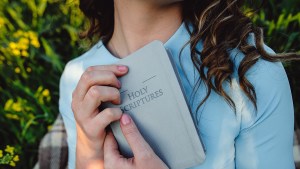January 24, 2021, is Word of God Sunday.
One option for living this special day is to celebrate this rite, provided by the Pontifical Council for Promoting New Evangelization.
~
Following the Synod on the Word of God, the Post-Synodal Apostolic Exhortation Verbum Domini was published, where we can read:
The great mystery of marriage is the source of the essential responsibility of parents towards their children. Part of authentic parenthood is to pass on and bear witness to the meaning of life in Christ: through their fidelity and the unity of family life, spouses are the first to proclaim God’s word to their children. The ecclesial community must support and assist them in fostering family prayer, attentive hearing of the word of God, and knowledge of the Bible. To this end the Synod urged that every household have its Bible, to be kept in a worthy place and used for reading and prayer. Whatever help is needed in this regard can be provided by priests, deacons and a well-prepared laity. The Synod also recommended the formation of small communities of families, where common prayer and meditation on passages of Scripture can be cultivated. Verbum Domini, 85

Read more:
10 Ways to celebrate Word of God Sunday on January 24
During the Sunday of the Word of God, the entire family gathers around the main table of their home, where the crucifix, an icon of the Blessed Mother, a candle and the Bible are placed.
One of the family members lights the candle and says:
− The light of Christ
All respond:
− Thanks be to God
Then another person (the text can also be divided among several people) recites the following prayer:
Come within me Holy Spirit, in my heart and in my mind.
Pour forth your brilliance upon my intellect, so that I can know the Father in meditating on the word of the Gospel.
Grant me your love, so that even today, urged by your word, I can find you in the situations and people I meet.
Grant me your wisdom, so that in the light of your word, I may know how to live and judge what I have experienced today.
Grant me perseverance, so I can patiently penetrate the message of God in the Gospel. (St. Thomas Aquinas)
All respond:
− Amen.
A family member takes the Bible, opens it, and begins reading the following passage: Matthew 13: 1-9. “The Parable of the Sower”
Listen to the word of the Lord from the Gospel according to Matthew:
That same day Jesus went out of the house and sat beside the sea. And great crowds gathered about him, so that he got into a boat and sat there; and the whole crowd stood on the beach. And he told them many things in parables, saying: “A sower went out to sow. And as he sowed, some seeds fell along the path, and the birds came and devoured them. Other seeds fell on rocky ground, where they had not much soil, and immediately they sprang up, since they had no depth of soil, but when the sun rose they were scorched; and since they had no root they withered away. Other seeds fell upon thorns, and the thorns grew up and choked them. Other seeds fell on good soil and brought forth grain, some a hundredfold, some sixty, some thirty. He who has ears, let him hear.”
All family members kiss the book of Sacred Scripture.
A moment of silence follows, of meditation on the text just heard and of personal prayer. After that someone reads the following reflection (Editor’s note: for families with young children, select only the bold text):
Jesus tells a great crowd the Parable — that we all know well — of the Sower, who casts seeds over four different types of terrain. The Word of God, symbolized by the seeds, is not an abstract Word, but rather Christ himself, the Word of the Father who became flesh in Mary’s womb. Embracing the Word of God therefore, means embracing the personage of Christ; of Christ himself.
There are several different ways to receive the Word of God. We may do so like a path, where birds immediately come and eat the seeds. This would be distraction, a great danger of our time. Beset by lots of small talk, by many ideologies, by continuous opportunities for distraction inside and outside the home, we can lose our zest for silence, for reflection, for dialogue with the Lord, to the point that we risk losing our faith, not receiving the Word of God, as we are seeing everything, distracted by everything, by worldly things.
Another possibility: we may receive the Word of God like rocky ground, with little soil. There the seeds spring up quickly, but they also soon wither away, because they are unable to sink roots to any depth. This is the image of those who receive the Word of God with momentary enthusiasm, which however, remains superficial; it does not assimilate the Word of God. In this way, at the first difficulty, such as a discomfort or disturbance in life, that still-feeble faith dissolves, as the seed that falls among the rocks withers.
We can also — a third possibility that Jesus mentions in the parable — receive the Word of God like ground where thorny bushes grow. And the thorns are the deceit of wealth, of success, of worldly concerns… There, the Word grows a little, but becomes choked, it is not strong, and it dies or does not bear fruit.
Lastly — the fourth possibility — we may receive it like good soil. Here, and here alone does the seed take root and bear fruit. The seed fallen upon this fertile soil represents those who hear the Word, embrace it, safeguard it in their heart and put it into practice in everyday life.
This Parable of the Sower is somewhat the ‘mother’ of all parables, because it speaks about listening to the Word. It reminds us that the Word of God is a seed which in itself is fruitful and effective; and God scatters it everywhere, paying no mind to waste. Such is the heart of God! Each one of us is ground on which the seed of the Word falls; no one is excluded! The Word is given to each one of us. We can ask ourselves: what type of terrain am I?
Do I resemble the path, the rocky ground, the bramble bush? If we want, with the grace of God, we can become good soil, plowed and carefully cultivated, to help ripen the seed of the Word. It is already present in our heart, but making it fruitful depends on us; it depends on the embrace that we reserve for this seed.
Often one is distracted by too many interests, by too many enticements, and it is difficult to distinguish, among the many voices and many words, that of the Lord, the only one that makes us free. This is why it is important to accustom oneself to listening to the Word of God, to reading it.
And I return once more to that advice: always keep a handy copy of the Gospel with you, a pocket edition of the Gospel, in your pocket, in your purse … and then, read a short passage every day, so that you become used to reading the Word of God, understanding well the seed that God offers you, and thinking with what soil do I receive it.
May the Virgin Mary, perfect model of good and fertile soil, help us, with her prayer, to become willing soil without thorns or rocks, so that we may bear good fruit for ourselves and for our brothers and sisters.
Pope Francis, Angelus, 12 July 2020
–
After the reflection, everyone recites the Lord’s prayer together:
− Our Father …
At the end of the prayer, the person who lit the candle takes the Bible and makes the sign of the cross with it, blessing the whole family with the Holy Scripture.
The candle is extinguished, saying:
– Stay with us, Lord, now and forever and ever. Amen.

Read more:
Reasons Catholics should read the Bible

